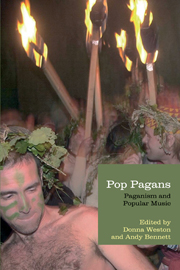Book contents
- Frontmatter
- Contents
- Contributors
- Foreword
- 1 Towards a definition of Pagan music
- Part I Histories
- Part II Genres
- Part III Performance
- Part IV Communities
- 11 Sacramental song: theological imagination in the religious music of American Pagans
- 12 The rise of the Celtic cyber-diaspora: the influence of the “New Age” on internet Pagan communities and the dissemination of “Celtic” music
- 13 Esoterrorism and the wrecking of civilization: Genesis P-Orridge and the rise of industrial Paganism
- Bibliography
- Discography and filmography
- Index
12 - The rise of the Celtic cyber-diaspora: the influence of the “New Age” on internet Pagan communities and the dissemination of “Celtic” music
from Part IV - Communities
- Frontmatter
- Contents
- Contributors
- Foreword
- 1 Towards a definition of Pagan music
- Part I Histories
- Part II Genres
- Part III Performance
- Part IV Communities
- 11 Sacramental song: theological imagination in the religious music of American Pagans
- 12 The rise of the Celtic cyber-diaspora: the influence of the “New Age” on internet Pagan communities and the dissemination of “Celtic” music
- 13 Esoterrorism and the wrecking of civilization: Genesis P-Orridge and the rise of industrial Paganism
- Bibliography
- Discography and filmography
- Index
Summary
The Irish diaspora provides an enormous consumer base for the selling of “Irishness” and nostalgia. However, the appropriation of the word “Celtic” as a marketing tool has expanded this target audience significantly, which has coincided with a renewed interest in “Celtic” mysticism and spirituality. The “New Age” movement is at the forefront of the Celtic renaissance. The plethora of Celtic websites advertising such wide-ranging topics as Druidism, Bardic paths, Celtic Wiccan ritual and Celtic reconstructionism bear testament to a renewed interest in Paganism and nature-based spirituality. The path to Celtic Pagan spirituality appears to centre on several core beliefs, some of which include cultivation of a creative spirit, reverence for the earth and a belief in early Celtic cosmology. The dissemination of Celtic mysticism via New Age websites invites anyone who shares these core beliefs to identify as Celtic, and more particularly as Celtic Pagans. This chapter will examine the various types of Celtic musics promoted on a variety of Celtic Pagan websites under the banner of Celtic popular music, and explore the way in which “Celtic” has become the vehicle for expressions of Paganism in late modern consumer societies.
- Type
- Chapter
- Information
- Pop PagansPaganism and Popular Music, pp. 176 - 188Publisher: Acumen PublishingPrint publication year: 2013



